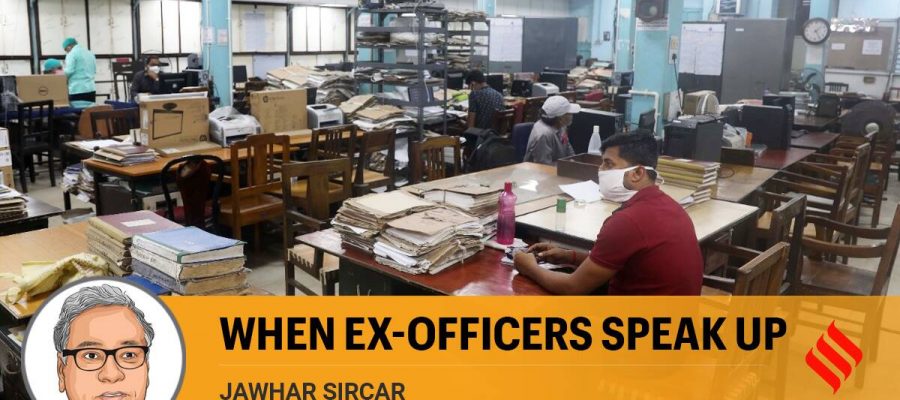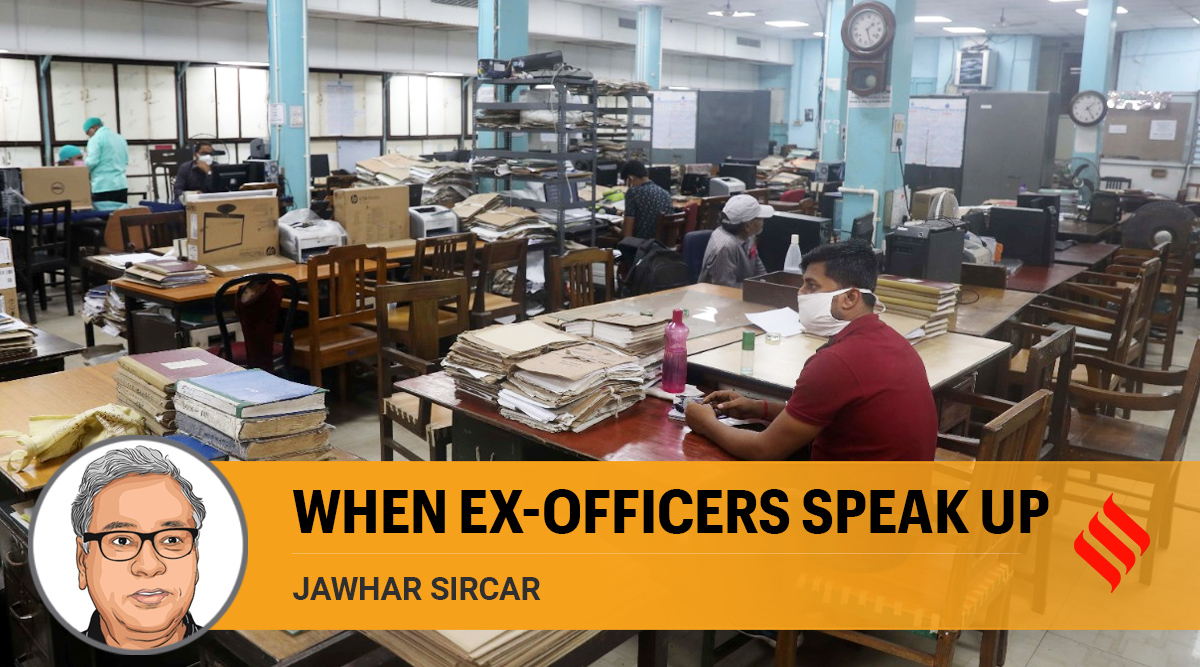There is no doubt that there is alarm over whether retired officers are talking too much. They are flashing too many yellow and red cards on the regime’s various acts of omission and commission.
One feels immensely relieved that at no point in one’s four decades of government service was one ever important enough to work in any of the 25 critical organisations that deal with state security. This places one outside the scope of the central government order of May 31 that prohibits officers who retired from any of these listed organisations to publish without taking prior clearance from the government. It bans discussions on “the domain of the organisation”, a bureaucratic way of saying “don’t spill the beans”. The more important restriction is on revealing any “expertise or knowledge gained by virtue of working in that organisation”. This is as ambiguous as, say, our Covid mortality statistics, prone to conflicting interpretations. The next clause that one cannot share any “sensitive information” was known to all responsible officers — which phrase hopefully covers retired ones as well. The present dispensation, of course, takes no chances with retired bureaucrats, and sternly reminds them not to disclose information that would “prejudicially affect the sovereignty and integrity of India, the security, strategic, scientific or economic interests of the State”.
It is unusual for this government to be so explicit — when it is so remarkably economic with facts and details on more immediate issues, like what plastic surgery is being rushed through on Delhi’s face, the Central Vista. As the order stands, it covers a minuscule but very interesting section of the bureaucracy — those who worked in specific intelligence and security organisations and organisations prone to raiding, like the CBI, ED or Income Tax (Investigation). Hopefully, others may continue to write, criticise, “kiss and tell”, but it is surely a warning to them that this ban may be extended to them, any time.
The notification also amends the central pension rules, enabling the government to withhold the pension of those who defy. Yet, the same rules also mention that pension is “not in the nature of reward but there is a binding obligation…. which can be claimed as a right”. The catch is that it insists on “future good conduct” as a “condition of every grant of pension and its continuance.” While this “good conduct” clause gladdens padres and moral science teachers, these delightfully contradictory provisions mean that the government keeps all its options open. The courts are, however, not amused and have historically ruled in favour of the pensioner. There are mountains of judgments against executive attempts to use pension against troublesome retirees. Yet, the judiciary does appear to get quite reticent when “security” is invoked by the government, as in the Bhima Koregaon cases that never seem to end.

This does not, of course, entitle a retired officer to endanger the nation’s security, but surely, one is mature enough to distinguish between genuine protests and sedition. Whether busting scams in intelligence or police organisations constitutes a security hazard would, however, have to be decided by courts, if pensions of crusaders are stopped. Holding a view contrary to the government’s prevailing narrative can surely not be equated with treachery — even when it is on a sensitive issue like Kashmir or general security. Some may feel that it would be beneficial for our security system if experienced police officers analysed why and how one of the most grievous lapses in intelligence and security took place in a tightly controlled zone like Pulwama. But none may do so, if stopping pension is threatened. Let us remember that, with current advancements in technology, the enemy’s satellite can now not only see moving trucks but also their number plates. Hence, orders that were meant for colonial times or even for the late 20th century may not suffice.
There is no doubt that there is alarm over whether retired officers are talking too much. They are flashing too many yellow and red cards on the regime’s various acts of omission and commission. The counter strategy to muster obliging retired bureaucrats and diplomats to speak in the government’s favour and attack their former colleagues has not been a box-office hit. It may certainly have been more productive if the government tried to understand what drives such large numbers of retired secretaries, ambassadors, directors-general of police and others to speak out against its policies. After all, till recently, senior bureaucrats retired in peace and were quite satisfied with playing bridge or golf. Even now, the vast majority holds its tongue, as it has been trained to, over a whole lifetime. Many bureaucrats surely know better than the public what benefits accrue from silence and acquiesce. The risks of contesting the government are high, but then, there comes a crossroad in life when a 92-year-old Julio Ribeiro and many of his retired colleagues just have to speak up.
This column first appeared in the print edition on July 3, 2021 under the title ‘When ex-officers speak up’. The writer is a retired culture secretary and former CEO of Prasar Bharati.
Source: Read Full Article


